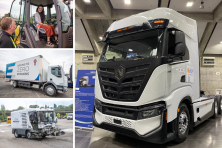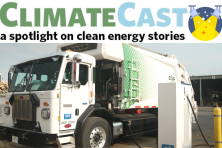Oregon’s 2021 legislative session has come to a close. We’ve made some major progress on statewide climate action, but before we dive into those details, let’s talk about how we got here.
After a year of tumult and tragedy—from the COVID-19 pandemic and economic fallout, massive wildfires, and yet another partisan legislative walkout—the mood in Climate Solutions’ virtual Oregon office this January 2021 was that of stalwart determination. As we finalized our plans for the upcoming first-ever virtual legislative session, we knew that many Oregonians were struggling to make end’s meet and keep their families healthy. Accordingly, we expected state legislators to be laser-focused on post-COVID economic recovery, wildfire relief, and ensuring that the state remained solvent and open for business. We also knew that in the face of a growing climate crisis and rising fossil fuel pollution in our state, the Oregon legislature needed to meet the moment with major climate progress.
Short on time?
Download our updated 2021 legislative agenda, with post-session commentary and bill statuses.
To address these myriad struggles facing Oregonians and the state, Climate Solutions and our partners pursued a full agenda of climate and clean energy legislative priorities that were tailored to reduce pollution, boost our clean energy economy, and get cost-saving solutions to more Oregonians. A statewide 100% clean energy commitment. Building code changes to ensure new buildings could be more energy efficient and that they include electric vehicle charging infrastructure. Extensions to state electric vehicle incentive programs and the successful Energy Trust of Oregon—both which faced sunsets. Strengthening appliance efficiency standards to match our West Coast neighbors. All with real climate and clean air benefits, all eminently achievable, and all helpful to fueling the state’s economic recovery and create new job opportunities.
Environmental justice and community organizations from across Oregon also brought major legislative priorities this session that were critical to ensure a just clean energy transition in our state. With the Oregon Just Transition Alliance, the Oregon Clean Energy Opportunity coalition brought bills for 100% Clean Energy for All, Energy Affordability (creating low income protections for energy bills), and Healthy Homes (funding holistic home upgrades to improve weatherization, energy efficiency and health). NAACP-Eugene/Springfield and Beyond Toxics brought an Equity and Climate in Land Use bill and Environmental Justice joint resolution to adopt a vision and set of principles for achieving environmental justice in Oregon.
“In the face of unrelenting climate impacts, our state must respond with unrelenting climate action.”
--Meredith Connolly
Oregon Director of Climate Solutions
“Oregon has experienced firsthand the unfortunate reality that climate change, and the underlying fossil fuel pollution driving it, is a threat multiplier that can’t be ignored. We can’t hit pause on responding to the climate crisis because we have other crises facing our state,” said Meredith Connolly, Oregon Director of Climate Solutions. “In the face of unrelenting climate impacts, our state must respond with unrelenting climate action. The good news is the biggest things we can do to curb climate pollution have major benefits for our state and communities.”
After many months of a legislative session like no other—representing countless hours of analyzing legislative concepts, strategizing with allies and partners, organizing our supporters, testifying before committees, and advocating with legislators—the Oregon Legislature adjourned sine die on June 29th. Looking back on this historic session, we're proud to report that after a five year hiatus, Oregon's Legislature has once again enacted major climate action, leaping from laggard to climate leader.
100% clean electricity
The biggest win for climate this year passed on the very last day of session! House Bill 2021 commits the state’s major electric utilities to transition to 100% clean, renewable sources by 2040, establishes a $50 million fund for community-based renewable energy projects, and requires wage, benefits and apprenticeship utilization for new renewables and storage projects to create good family-wage jobs while transitioning away from fossil fuel sources like coal and gas.
HB 2021 passed the legislature with broad support led by the Oregon Clean Energy Opportunity coalition, making Oregon a clean energy leader among states transitioning to 100% clean energy. As Bob Jenks, Executive Director of Oregon Citizens’ Utility Board observed, “HB 2021 was backed by the largest and most diverse coalition to have ever supported clean energy legislation in Oregon.” With the most ambitious timeline of carbon-free electricity by 2040 (and 80% carbon-free by 2030, 90% by 2035), a ban on building new gas plants in the state, strong labor standards, and environmental justice embedded into the transition, Oregon’s new law is a blueprint for an equitable transition to our clean energy future. This is a momentous win!
Cleaner, healthier, more efficient buildings
One of the biggest missed opportunities to make climate progress was the legislature’s failure to pass the REACH Code after it passed out of its policy committee. The Reach Code bill (House Bill 2398) represented a major opportunity to increase energy efficiency and reduce climate pollution in new buildings. Mayors of cities around the state want and need this tool to help lock-in more energy savings when new buildings that will exist for at least 50 years are constructed, and the state should not hold back cities who want to lead on climate.
We’re happy to report that bills ensuring the extension of incentives for solar and energy efficiency in existing buildings and industry through Energy Trust of Oregon (House Bill 3141) and more energy-efficient new appliances (House Bill 2062) did pass this year! It is clear that tackling climate pollution in Oregon’s built environment remains unfinished business and will be a huge area of focus for us in future legislative sessions.
Transportation electrification
We made tremendous progress with the legislature passing bills that will help more Oregonians afford to switch to electric vehicles and build out more of the EV infrastructure needed for electric cars, trucks, buses and more (House Bills 2165 and 2180)! Click here to learn more about these bills’ significance and what’s needed next to equitably electrify our transportation system. Efforts led by partners to boost investment in transit, biking and safety fell short; however, they remain a major priority to reduce climate pollution and increase transportation funding that supports safe, affordable, equitable and electric multi-modal transit options.
Just Transition to a clean energy economy
Rounding out the trifecta of bills successfully championed by the Oregon Clean Energy Opportunity coalition (along with 100% Clean), new laws passed that will help ensure low income families have stable, affordable energy bills (House Bill 2475) and healthy, weatherized homes (House Bill 2842). These are critical parts of Oregon’s equitable transition to a clean energy-powered economy. Unfortunately, other efforts to ensure that climate and equity are embedded into our land use laws (House Bill 2488) and that public projects use low-carbon products fell short at the very last minute.
Conclusion
With needed climate progress delivered by the Oregon Legislature, 2021 is shaping up to be a promising year for climate action. In addition to Oregon dedicating itself to generating 100% of its electricity from clean renewable sources, Washington State enacted their Climate Commitment Act and passed a Clean Fuels Standard, and climate action appears to be at the forefront of the federal administration’s priorities. We'd like to thank all of our allies, partners, and supporters, particularly our legislative champions, for helping us accomplish so much amid these challenging times.
Much work still remains to be done, particularly to reduce climate pollution in buildings, to curb rising transportation emissions from cars, trucks and other vehicles, and to ensure that these major wins don’t backslide during implementation in the face of pressure from the fossil fuel industry. We remain resolute in our mission to accelerate equitable solutions to the climate crisis; stay tuned for what’s next!




